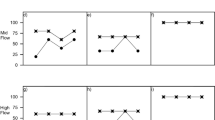Abstract
The present paper aims to give an analysis of properties of the phytosociological language, which relates to the vagueness of some concepts in vegetation science.
A translation of the simplest synsystematic propositions into possibility distributions has been proposed. Inferential relationships between sentences mentioned using the concept of semantic entailment have been reported.
Sentences describing habitat requirements of syntaxa are in fact disguised conditionals; their paraphrases have been given the form of implication. Since these sentences include fuzzy predicates their meaning is a fuzzy relation. The latter may constitute the basis of prediction by means of the compositional rule of inference.
Similar content being viewed by others
References
Baldwin, J. F. & Pilsworth, B. W. 1979. A model fuzzy reasoning through multi-valued logic and set theory. Int. J. Man-Machine Studies 11: 351–380.
Fukarek, F. 1964. Pflanzensoziologie. Akademie-Verlag, Berlin.
Hempel, C. G. 1965. Aspects of Scientific Explanation And Other Essays in the Philosophy of Science. The Free Press, New York.
Hersh, H. M. & Caramazza, A. A. 1976. A fuzzy set approach to modifiers and vagueness in natural language. J. Experimental Psychology (General) 105: 254–276.
Labov, W. 1973. The boundaries of words and their meanings. In: Bailey, C. J. & Shuy, R. M. (eds.), New Ways of Analyzing Variation in English. Georgetown University Pres, Washington.
Matuszkiewicz, W. 1981. A guide for identification of the plant communities of Poland. PWN, Warszawa (in Polish).
Moraczewski, I. R. 1993. Fuzzy logic for phytosociology Syntaxa as vague concepts. Vegetatio 106: 1–11.
Pawlowski, B. 1966a. Aquatic and swamp associations. In: Szafer, W. (ed.), The Vegetation of Poland, pp. 330–339. Permagon Press, Oxford.
Pawlowski, B. 1966b. High-mountain associations. In: Szafer, W. (ed.), The Vegetation of Poland, pp. 378–401. Pergamon Press, Oxford.
Pickett, S. T. A. & Kolasa, J. 1989. Structure of theory in vegetation science. Vegetatio 83: 7–15.
Sanchez, E. 1988. Fuzzy quantifiers in syllogisms, direct versus inverse computations. Fuzzy Sets and Systems 28: 305–312.
Turksen, I. B. 1988. Stochastic fuzzy sets: A survey. In: Kacprzyk, J. & Fedrizzi, M. (eds.), Combining Fuzzy Imprecision with Probabilistic Uncertainty in Decision Making, pp. 168–183. Springer-Verlag, New York.
Turksen, I. B. 1991. Measurement of membership functions and their acquisition. Fuzzy Sets and Systems 40: 5–38.
Yager, R. R. 1979. A note on probabilities of fuzzy events. Inf. Sci. 18: 113–129.
Zadeh, L. A. 1968. Probability measures of fuzzy events. J. Math. Anal. Appl. 23: 421–427.
Zadeh, L. A. 1975a. Calculus of fuzzy restrictions. In: Zadeh, L. A., Fu, K. S., Tanaka, K. & Shimura, M. (eds.), Fuzzy sets and their applications to cognitive and decision processes, pp. 1–39. Academic Press, New York.
Zadeh, L. A. 1975b. The concept of a linguistic variable and its application to approximate reasoning. Part I, Information Science 8: 199–249; Part II, Information Science 8: 301–357; Part III, Information Science 9: 43–80.
Zadeh, L. A. 1978a. PRUF—a meaning representation language for natural languages. Int. J. Man-Machine Studies 10: 395–460.
Zadeh, L. A. 1978b. Fuzzy sets as a basis for a theory of possibility. Fuzzy Sets and Systems 1: 3–28.
Zadeh, L. A. 1983a. A computational approach to fuzzy quantifiers in natural languages. Computer and Mathematics 9: 149–184.
Zadeh, L. A. 1983b. The role of fuzzy logic in the management of uncertainty in expert systems. Fuzzy Sets and Systems 11: 199–227.
Author information
Authors and Affiliations
Rights and permissions
About this article
Cite this article
Moraczewski, I.R. Fuzzy logic for phytosociology. Vegetatio 106, 13–20 (1993). https://doi.org/10.1007/BF00044855
Accepted:
Issue Date:
DOI: https://doi.org/10.1007/BF00044855




